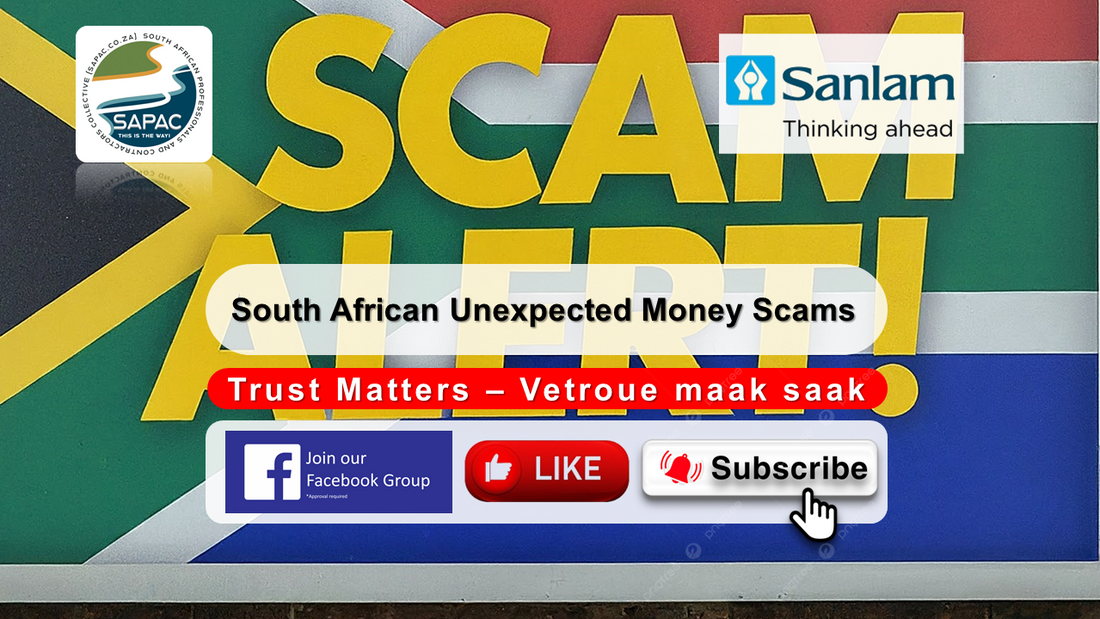
South African Unexpected Money Scams
SAPAC ReporterShare
South African Unexpected Money Scams
Prepared by : Independent
Article Classification: Types of Scams
Image courtesy: SAPAC Professionals and Contractors
Get in contact with SAPAC:![]() Besoek | Visit https://sapac.co.za/
Besoek | Visit https://sapac.co.za/
📑 Complete Form: Link (PRESS HERE) FOR SAPAC
[GOEIE INFORMASIE] SLUIT AAN! https://bit.ly/JoinSAPAC
Areas: Southern Africa, Northern Cape, Western Cape, Cape Winelands, Free State, Gauteng, North West Province, Limpopo, Mpumalanga, Natal
South African Unexpected Money Scams
Don’t lose your money trying to access entitlements, rebates or winnings. Offers of free money will cost you a lot.
Scammers try to convince you that you are owed or entitled to, money or winnings that you did not expect to receive.
The scammer asks you to pay a fee or to give your identity or financial details so you can get the winnings or money. There will never be free money, and you will lose more money trying to get it.
Warning signs it might be a scam
- Unexpected letters, texts, emails, WhatsApp messages or any contact that say you are entitled to money, compensation, or an inheritance.
- You are asked to pay money up-front, like fees or taxes to get money or prizes; but you haven’t entered a competition.
- A letter or email looks official and asks you for an upfront ‘administration fee’ or tax to receive a refund or rebate.
- A court order says you are a beneficiary and asks for your identity information or money to make a claim.
Steps you can take to protect yourself
- Always stop, think, and check before you act. Offers of free money are too good to be true and are likely scams.
- Don’t pay a fee to collect winnings or a prize. Legitimate lotteries don’t ask you to do this.
- Never share your bank or credit card details or your identity documents to anyone you don’t know or trust. Government departments or trusted companies will never ask you to pay money upfront to claim a grant or rebate.
- Check with your bank, a legal service or a trusted friend or family member, to see if an offer is legitimate.
- Do an internet search using the names or contact details to check for any references to a scam.
- If a friend or family member sends you a message about a prize on social media, check with them outside of social media that they sent it.
Think you've been scammed?
1. Act fast to stop any further losses
Contact your bank or card provider immediately to report the scam. Ask them to stop any transactions.
Change passwords on all your devices and online accounts like email, banking, government sites and shopping sites.
2. Report the Scam
Once you have had the opportunity to have secured your details, you should open up a SAPS Case number, you can help us to try and stop the scammers or to warn other by reporting the scam to us. Depending on the nature of the scam site with a case number it can be listed.
3. Get help to recover
With your case number visit your nearest Department of Home Affairs and provide them with the information of your case including your signed affidavit. They should be able to capture the fact that your personal details may have been stolen and may be used for criminal activities. Visit their Website and make an appointment https://www.dha.gov.za/
South Africa Current Time (SAPAC Time) - 24 Hour Format
South African Professionals and Contractors (SAPAC) Time

